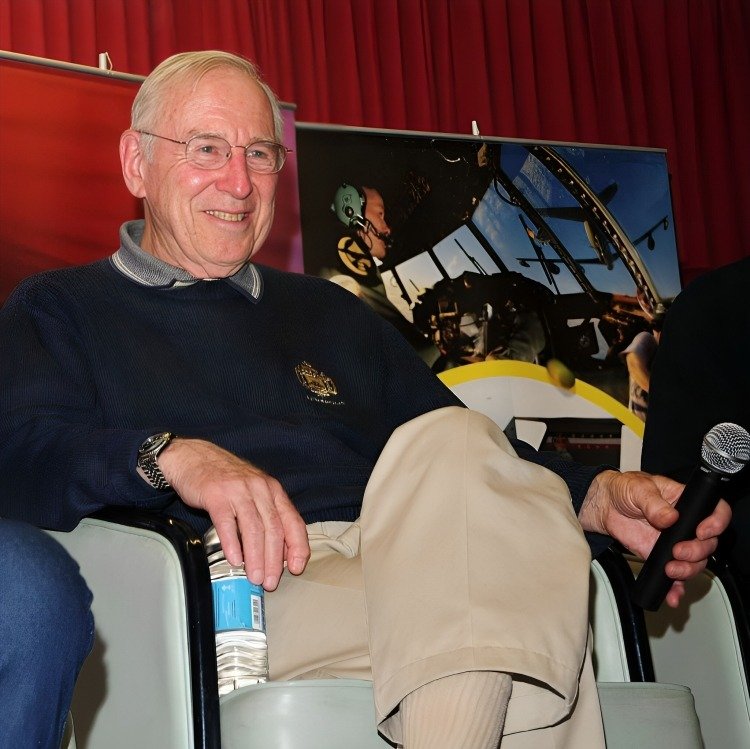Jim Lovell once said that failure only teaches lessons if we survive to tell them. In a career defined by firsts, close calls and lunar voyages, he exemplified that spirit. On 7 August 2025, the United Kingdom and the world bid farewell to the legendary astronaut Jim Lovell, who guided Apollo 13 safely home and helped open the Moon’s frontier on Apollo 8.
From Naval Aviator to NASA Astronaut
Born in Cleveland in March 1928, Jim Lovell found his calling in the United States Navy. After graduating top of his class at the Naval Academy, he flew night fighters during the Korean War and later trained as a test pilot. In September 1962, he joined NASA’s second recruiting group of astronauts. By December 1965, Lovell had already flown a record-breaking 14-day Gemini 7 mission. His calm demeanour and technical skill marked him out for ever greater challenges.
The Lunar Trailblazer
As command module pilot on Apollo 8 in December 1968, Jim Lovell etched his name into history as one of the first three humans to leave Earth orbit. When the craft rounded the far side of the Moon, he peered through the porthole at the dark lunar landscape and famously declared, “Reality is far better than dreams.” Apollo 8’s success gave NASA the edge in the space race and paved the way for the first Moon landing the following year.
“Houston, We Have a Problem”
Jim Lovell’s greatest trial came on 11 April 1970 aboard Apollo 13. Two days into the mission, an oxygen tank exploded in the service module. Instantly, the crew lost electrical power, cabin heat and much of their oxygen. Lovell’s leadership in those tense hours proved vital. He and his fellow astronauts improvised repairs, conserved resources and guided the crippled spacecraft on a looping trajectory around the Moon that returned them safely to Earth.
In a nation transfixed by distressing images from space, Jim Lovell’s cool professionalism calmed fears. The world breathed anew when the crew splashed down on 17 April. His understated remark, “…a successful failure,” came to symbolise human ingenuity under pressure.
A Legacy of Records and Recognition
Over four flights, Jim Lovell amassed more than 715 hours in space. He became the first person to journey to the Moon twice and remains the only human to do so without setting foot on its surface. His decorations include the Congressional Space Medal of Honour, the Presidential Medal of Freedom and numerous international awards. In Britain, the Royal Aeronautical Society welcomed him as an honorary fellow, citing his “unflappable courage” and “lasting inspiration” to space enthusiasts.
Reflections on NASA’s Greatest Crisis
Apollo 13’s near-disaster prompted significant safety overhauls in the space programme. Engineers redesigned oxygen tanks and improved mission-control procedures. Jim Lovell’s experiences influenced those changes. At a 1995 reunion in London, he told The Guardian that Apollo 13 taught NASA an enduring lesson: “An astronaut must never leave Earth unprepared for every possible emergency.”
Jim Lovell and the British Connection
While Jim Lovell’s voyages were NASA missions, they resonated across the Atlantic. His voice beamed into UK living rooms during live broadcasts, igniting public support for human spaceflight. The Science Museum in London holds items from the Apollo era, including a replica of the command module hatch. In 2022, Lovell visited the museum to unveil a new exhibit, encouraging UK students to pursue science and engineering careers.
A Story Told on Screen
Jim Lovell’s exploits entered popular culture most vividly through Ridley Scott’s 1995 film “Apollo 13.” Portrayed by Tom Hanks, his measured leadership and wry humour reached a new audience. The film’s tag line, “Failure is not an option,” distilled his resolve. In subsequent years, Lovell expressed admiration for the movie, calling it “a fitting tribute” and praising its technical accuracy.
Personal Life and Pursuits
After retiring from NASA in 1973, Jim Lovell settled in Illinois with his wife, Marilyn. Together, they opened a restaurant that became a local landmark. He served on corporate boards, published memoirs and remained a sought-after speaker. In interviews, he often cited his family’s quiet support as his greatest strength.
Remembering Jim Lovell
Jim Lovell’s passing on 7 August leaves a void in the community of space pioneers. Tributes poured in from world leaders, space agencies and fans in the United Kingdom. The UK Space Agency called him “a guiding star for generations” and highlighted his example of resilience. At the Royal Astronomical Society’s August meeting, members observed a moment’s silence.
His life reminds us that exploration carries risks but yields rewards that expand human potential. As Jim Lovell himself wrote, “We must dare the unknown or remain in the darkness forever.” His journey from naval aviator to lunar pathfinder set a course that countless UK scientists and engineers continue to follow.
Jim Lovell’s Enduring Inspiration
Jim Lovell’s name will endure in space history and in the hearts of those who champion British contributions to exploration. Schools, museums and amateur astronomy clubs will tell his story. In the UK, where satellites relay data on climate change and deep-space probes venture beyond our solar system, his legacy shines. Jim Lovell showed that under pressure, innovation and teamwork can turn near-catastrophe into triumph.
As we reflect on his remarkable life, let us heed his example of steadfast courage, thoughtful leadership and boundless curiosity. Jim Lovell charted new paths among the stars. In doing so, he inspired a world — including the United Kingdom — to look up and keep reaching for the Moon and beyond.
Read More: Ring Cameras in the UK: Security and Shifting Public Opinion

